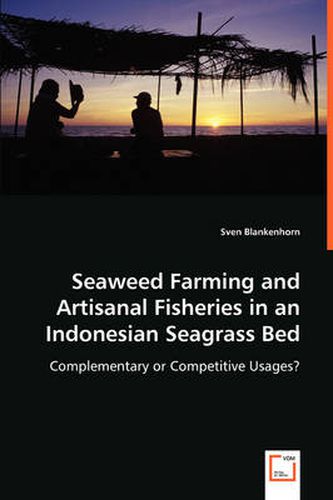Readings Newsletter
Become a Readings Member to make your shopping experience even easier.
Sign in or sign up for free!
You’re not far away from qualifying for FREE standard shipping within Australia
You’ve qualified for FREE standard shipping within Australia
The cart is loading…






This title is printed to order. This book may have been self-published. If so, we cannot guarantee the quality of the content. In the main most books will have gone through the editing process however some may not. We therefore suggest that you be aware of this before ordering this book. If in doubt check either the author or publisher’s details as we are unable to accept any returns unless they are faulty. Please contact us if you have any questions.
In Indonesia, coastal villages traditionally strongly depend on fisheries. With increasing population density and fishing pressure, alternative sources of income become more important. One economic activity is seaweed farming, which has been introduced in Indonesia since the 1980s. Algae farming is mostly restricted to shallow coastal waters and their natural ecosystems, e. g. seagrass beds. They themselves are habitats for many species which are the basis for traditional fisheries. Therefore, if seaweed farming causes the seagrass ecosystem to change, its economical benefits might be outbalanced by losses in the fisheries sector. The research for this thesis included investigations of seaweed farming and its economic importance and influence on sea-grass flora, the economic importance of artisanal fisheries’ practices and implications for management, and the variation of fish stock and gill net fishery in a seagrass bed in South Sulawesi, Indonesia. This book provides insight in the dynamics of a socio-ecological system and gives guidelines for development agencies and decision makers for the implementation of seaweed farming as an source of alternative income in the Indo-Pacific.
$9.00 standard shipping within Australia
FREE standard shipping within Australia for orders over $100.00
Express & International shipping calculated at checkout
This title is printed to order. This book may have been self-published. If so, we cannot guarantee the quality of the content. In the main most books will have gone through the editing process however some may not. We therefore suggest that you be aware of this before ordering this book. If in doubt check either the author or publisher’s details as we are unable to accept any returns unless they are faulty. Please contact us if you have any questions.
In Indonesia, coastal villages traditionally strongly depend on fisheries. With increasing population density and fishing pressure, alternative sources of income become more important. One economic activity is seaweed farming, which has been introduced in Indonesia since the 1980s. Algae farming is mostly restricted to shallow coastal waters and their natural ecosystems, e. g. seagrass beds. They themselves are habitats for many species which are the basis for traditional fisheries. Therefore, if seaweed farming causes the seagrass ecosystem to change, its economical benefits might be outbalanced by losses in the fisheries sector. The research for this thesis included investigations of seaweed farming and its economic importance and influence on sea-grass flora, the economic importance of artisanal fisheries’ practices and implications for management, and the variation of fish stock and gill net fishery in a seagrass bed in South Sulawesi, Indonesia. This book provides insight in the dynamics of a socio-ecological system and gives guidelines for development agencies and decision makers for the implementation of seaweed farming as an source of alternative income in the Indo-Pacific.